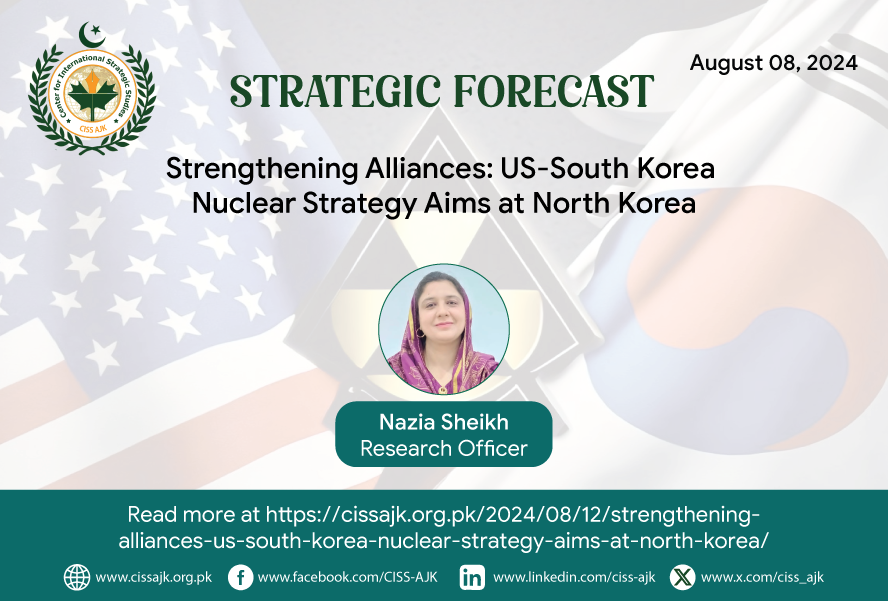At a NATO meeting in July 2024, U.S. and South Korean officials adopted new guidelines for nuclear deterrence and operations with regards to Korean Peninsula. The rules are intended to fortify the alliance’s posture against North Korean threats and to bolster its nuclear deterrence policy. With the end of the Cold War, the agreement signifies the greatest ties ever between U.S. and South Korea. With no nuclear weapons of its own and depending heavily on the U.S. “nuclear umbrella,” South Korea faces a serious security threat from North Korea’s expanding arsenal. Along with that the issue is that this agreement has institutionalized South Korea’s subjection to powerful nations and severely undermine the military’s sovereignty. Labelling nuclear bombs that are prepared to be placed onto strategic bombers or ballistic missiles launched from submarines with the Korean Peninsula would likewise be absurd. In other words, without incurring any new liabilities, the US has acquired a strategic edge.
North Korea response to US-South Korea nuclear alliance
Any nuclear attack by North Korea against the United States or the Republic of Korea (ROK) will be confronted with a “swift, overwhelming, and decisive response,” according to the joint presidential statement. It emphasized the strides made by the Nuclear Consultative Group, founded in April 2023, to support U.S. nuclear operations through conventional support and cooperative atomic planning. Building on efforts to improve information sharing, crisis consultation, and coordinated exercises, the recommendations offer parameters for maintaining effective nuclear deterrence. A commitment made by Washington to use all of its military might, including nuclear weapons, to defend Seoul is known as “extended deterrence.” The United States will be the source of South Korea’s advanced weaponry. Though in practice that will only serve to further solidify US leadership and primacy in its alliance with South Korea. It will also be necessary to update joint operation plans to include nuclear operations and nuclear war plans, given the concept of a nuclear-backed alliance.
North Korea criticized its competitors’ new defense guidelines, which it claims show an intention to attack the North, and warned to increase its nuclear fighting capabilities and make the US and South Korea pay “an unimaginably harsh price.” North Korea has said that it was compelled to seek nuclear weapons to counter the nuclear threats emanating from the United States. Officials from the United States and South Korea have declared unequivocally that they do not plan to attack North Korea.
By declaring the development of nuclear weapons capacity in the constitution last year and codifying their use in the case of a perceived threat against its territory, North Korea has openly advanced its nuclear weapons program. In a sharp reversal of their 2018 peace initiatives, it named South Korea as its “primary foe” earlier this year and threatened to destroy its neighbor for assisting the US in waging war on it.
Fears about theater-level training exercises being held regularly
The U.S. and South Korea established the consultative committee last year to improve communication over nuclear operations and talk about how to combine South Korean conventional weapons with U.S. nuclear weapons in various circumstances. Though there are rumors that the United States does not have any preparations for using its extended deterrence for its Asian partner, the country has traditionally pledged to deploy all of its arsenal, including nuclear weapons, to protect South Korea in the case of an attack. There are no nuclear weapons in South Korea. It makes no sense militarily or strategically to reserve specific US nuclear assets for use in missions on the Korean Peninsula. A US mainland ICBM launched towards Pyongyang would essentially follow the same trajectory as one directed towards Beijing.
A number of South Korean scholars and politicians have publicly questioned the legitimacy of the United States’ promise, given that recent North Korean weapons tests indicate the nation is moving closer to obtaining long-range nuclear missiles that might reach the U.S. mainland. Worries about North Korea have further deepened as North Korean leader Kim Jong Un and Russian President Vladimir Putin signed a deal in June 2024 mandating each country to provide aid to the other in case of an attack and pledging to increase additional relations, which has further heightened concerns about North Korea.
Reaffirming Washington’s commitment to Seoul’s defense, the new U.S.-South Korea nuclear deterrent rules do not specifically threaten nuclear retaliation. By guaranteeing South Korea of US extended deterrence, this strategy preserves strategic uncertainty over Washington’s possible response to North Korean threats.
South Korea’s internal issues may be the focus of the guidelines. Once Russian President Vladimir Putin visited North Korea in June, several well-known conservatives in South Korea demanded that the country build its nuclear weapons. By showcasing a deeper U.S.-South Korea cooperation, the Biden and Yoon administrations will probably use new principles to tamp down such challenges. If the new regulations are successful in allaying South Korea’s security worries that is yet to be determined.
Nuclear war exercises are necessary for a true nuclear-based alliance. Of course, previously combined military drills between the US and South Korea have drawn criticism for being nuclear war games. However, they will start hosting annual theater-level nuclear operation drills that will be unprecedented in the history of the world.
Author: Nazia Sheikh
Email: Nsheikh536@gmail.com
Bio: Nazia Sheikh is a Research Officer at Centre for International Strategic Studies, AJK. She is an MPhil scholar in international relations from international Islamic university Islamabad.

